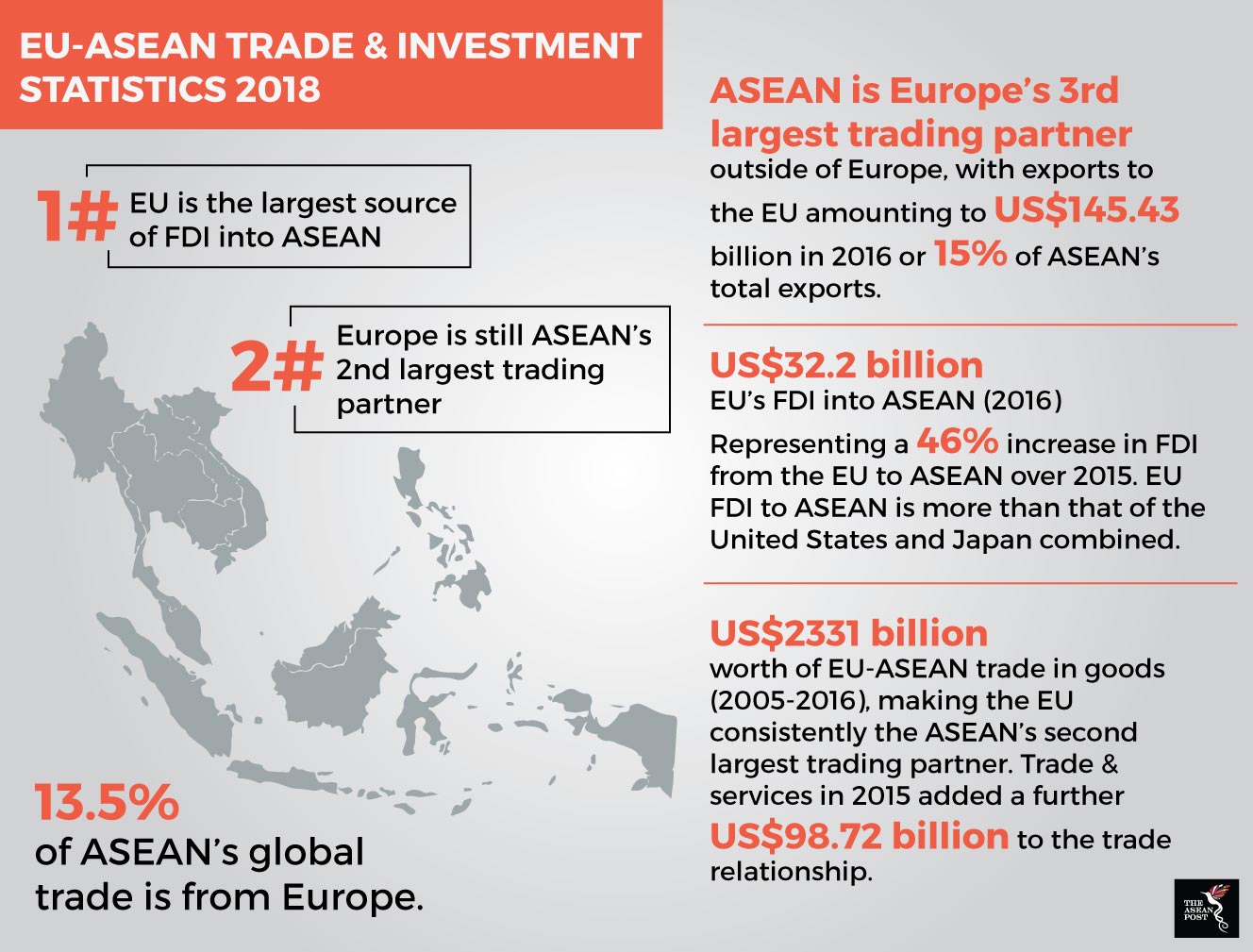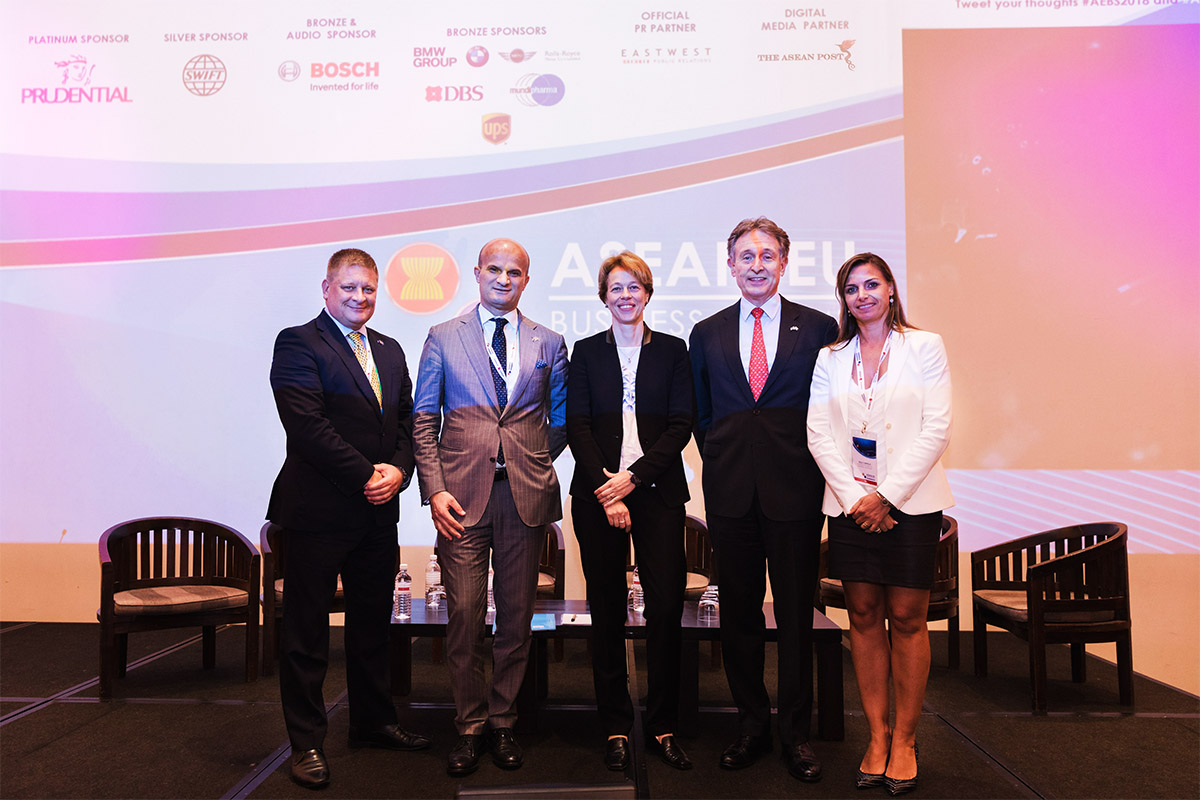The European Union (EU) and ASEAN celebrated 40 years of diplomatic relations in 2017, with trade characterising the strongest dimension of their relationship thus far. As ASEAN chair, Singapore this year hosted the sixth ASEAN-EU Business Summit, which coincided with the 24th ASEAN Economic Ministers’ (AEM) Retreat in Singapore from 1-3 March, 2018.
At the ASEAN-EU Business Summit, opening remarks were delivered by Donald Kanak, Chairman of the EU-ASEAN Business Council, H.E. Francisco Fontan, EU Ambassador to ASEAN, and H.E. Lim Hng Kiang, Minister for Singapore’s Ministry of Trade and Industry. Cecilia Malmstrom, EU Trade Commissioner and Wilf Blackburn, CEO of Prudential Singapore delivered the keynote addresses at the summit.
All parties stressed the importance of deepening trade ties between the EU and ASEAN in order to navigate a more challenging global trading climate.
“Ultimately the goal was to work towards region-to-region FTA (free trade agreement),” EU Trade Commissioner Cecilia Malmstrom said during her keynote address. Such a region-to-region FTA would liberalise ASEAN markets even further, creating stronger potential for foreign direct investment (FDI), for one. The EU currently accounts for 13.5% of ASEAN trade, making it ASEAN’s second largest trading partner.
Talks for a region-to-region FTA are currently underway and a consultation meeting is expected to take place sometime in 2019 to discuss further progress on the matter.
Meanwhile, the EU has been building bilateral trade relations with individual Southeast Asian nations. So far, these bilateral trade agreements have been with Singapore, Thailand, Vietnam and Indonesia. Bilateral negotiations between the EU and Singapore were initially concluded in 2014, but have been delayed from coming into effect due to certain underlying legal issues. The completed documents are now expected to be sent to the Council of the European Union and the European Parliament for approval.
“If all goes well, we hope the agreement can enter into force later this year, which is not a day too early,” Ms Malstrom told the Business Times after the conclusion of the 24th ASEAN Economic Ministers’ (AEM) Retreat in Singapore.
Connectivity was also a main point of discussion at the Summit, centred around the need for streamlined regulatory measures and policies, among other issues. The implementation of the ASEAN Single Window by five ASEAN member states so far, was one development lauded by all parties present at the summit. In essence, the regional initiative allows for the automated exchange of cross-border documentation between seaports and airports, which facilitates smoother trade.

Source: ASEAN-EU Business Summit 2018
Connectivity, in turn, has an effect on labour mobility, which is still relatively weak within the ASEAN region. Some issues still hindering labour mobility include key differences between the immigration policies of the 10 ASEAN nations and the wide disparity of income.
Another theme that resonated throughout the summit was the digitalisation of Southeast Asian economies. As digitalisation permeates every aspect of the economy and effects society in general, the right ecosystem first needs to be in place. Financial infrastructure, for instance, is needed to facilitate cross-border digital payments, while localised data servers are needed to facilitate free data flow within the region. Meanwhile, an adequate labour force skilled in technological know-how is crucial to operate such infrastructure as well as to foster further digital innovation. EU businesses’ FDI into ASEAN is key to setting up this ecosystem as it would allow the necessary infrastructure to be built, as well as the necessary knowledge transfer to take place.
EU businesses also have a further role in helping ASEAN nations achieve sustainable development. One way of doing this is by using new technologies to achieve energy efficiency. Southeast Asian governments also need to establish the right frameworks to encourage investments in new technologies.
This is where the role of the EU-ASEAN Business Council, the European Chamber of Commerce and the Singapore Business Federation comes into play. While some of these barriers require time and effort to overcome, this shouldn’t be a problem if all relevant parties come together and work towards a common goal.
